-
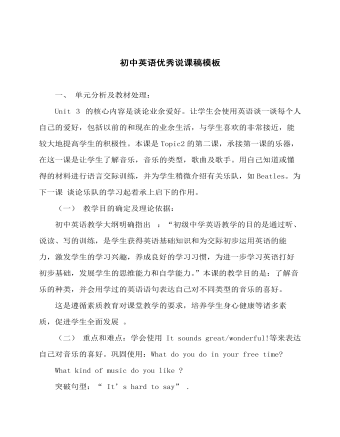
初中英语优秀说课稿模板
(一) 教学目的确定及理论依据:初中英语教学大纲明确指出 :“初级中学英语教学的目的是通过听、说读、写的训练,是学生获得英语基础知识和为交际初步运用英语的能力,激发学生的学习兴趣,养成良好的学习习惯,为进一步学习英语打好初步基础,发展学生的思维能力和自学能力。”本课的教学目的是:了解音乐的种类,并会用学过的英语语句表达自己对不同类型的音乐的喜好。
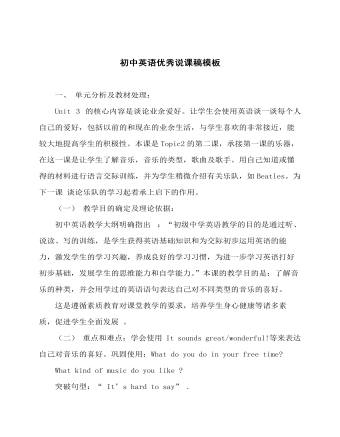
初中英语优秀说课稿模板
(一) 教学目的确定及理论依据:初中英语教学大纲明确指出 :“初级中学英语教学的目的是通过听、说读、写的训练,是学生获得英语基础知识和为交际初步运用英语的能力,激发学生的学习兴趣,养成良好的学习习惯,为进一步学习英语打好初步基础,发展学生的思维能力和自学能力。”本课的教学目的是:了解音乐的种类,并会用学过的英语语句表达自己对不同类型的音乐的喜好。这是遵循素质教育对课堂教学的要求,培养学生身心健康等诸多素质,促进学生全面发展。
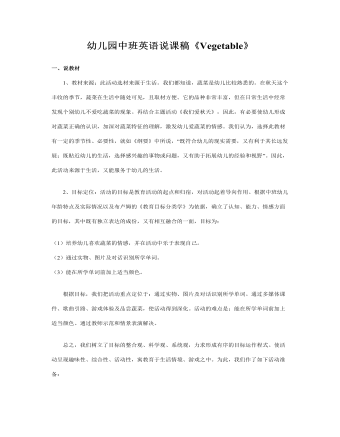
幼儿园中班英语说课稿《Vegetable》
2、目标定位:活动的目标是教育活动的起点和归宿,对活动起着导向作用。根据中班幼儿年龄特点及实际情况以及布卢姆的《教育目标分类学》为依据,确立了认知、能力、情感方面的目标,其中既有独立表达的成份,又有相互融合的一面,目标为:(1)培养幼儿喜欢蔬菜的情感,并在活动中乐于表现自己。 (2)通过实物、图片及对话识别所学单词。(3)能在所学单词前加上适当颜色。 根据目标,我们把活动重点定位于:通过实物、图片及对话识别所学单词。通过多媒体课件、歌曲引路、游戏体验及品尝蔬菜,使活动得到深化。活动的难点是:能在所学单词前加上适当颜色。通过教师示范和情景表演解决。 总之,我们树立了目标的整合观、科学观、系统观,力求形成有序的目标运作程式。使活动呈现趣味性、综合性、活动性,寓教育于生活情境、游戏之中。为此,我们作了如下活动准备:1、空间准备:把幼儿围成半圆形,操作台放于侧面。 2、物质准备:小熊毛绒玩具、创编歌曲、多媒体课件、各种蔬菜(如西红柿tomato、萝卜carrot、黄瓜cucumber、韭菜leek等)。3、经验准备:幼儿已经认识多种颜色,并对蔬菜有一定的经验(吃过或看过)。
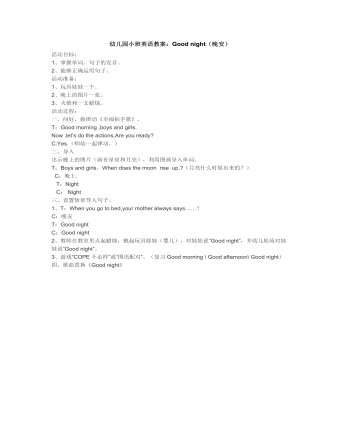
幼儿园小班英语教案:Good night(晚安)
2、能够正确运用句子。 活动准备: 1、玩具娃娃一个。 2、晚上的图片一张。 3、火柴和一支蜡烛。 活动过程: 一、问好,做律动《幸福拍手歌》。 T:Good morning ,boys and girls.Now ,let’s do the actions,Are you ready? C:Yes.(师幼一起律动。) 二、导入 出示晚上的图片(画有星星和月亮),利用图画导入单词。 T:Boys and girls。When does the moon rise up.?(月亮什么时候出来的?) C:晚上. T:Night
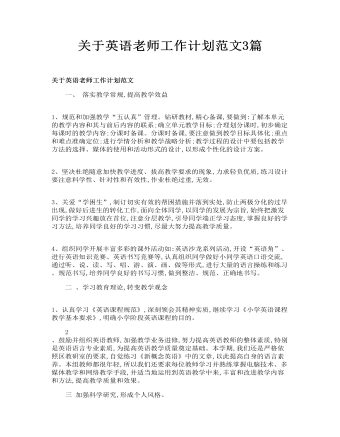
关于英语老师工作计划范文3篇
1、规范和加强教学“五认真”管理。钻研教材,精心备课,要做到:了解本单元的教学内容和其与前后内容的联系;确立单元教学目标;合理划分课时,初步确定每课时的教学内容;分课时备课。分课时备课,要注意做到教学目标具体化;重点和难点准确定位;进行学情分析和教学战略分析;教学过程的设计中要包括教学方法的选择、媒体的使用和活动形式的设计,以形成个性化的设计方案。??2、坚决杜绝随意加快教学进度、拔高教学要求的现象,力求轻负优质,练习设计要注意科学性、针对性和有效性,作业杜绝过重,无效。
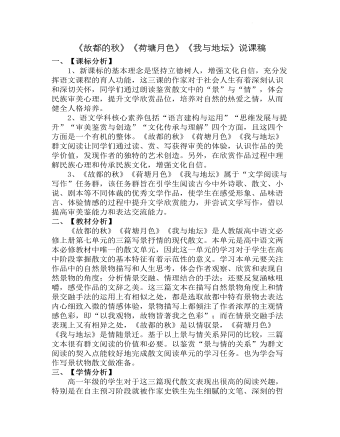
《故都的秋》《荷塘月色》《我与地坛》群文阅读说课稿 2022-2023学年统编版高中语文必修上册
(2) 中国文人的悲秋情结。3.《荷塘月色》中,作者为什么要离开家来到荷塘散步?4. 思考:作者的心里为何“颇不宁静?”(教师补充:写作背景)5. 出门散步后,作者的心情发生变化了吗? 有怎样的变化?6.思考讨论:为什么作者说“我”与“地坛”间有着宿命般的缘分,二者有何相似之处?(阅读1-5段)7.思考:作者从他同病相怜的“朋友“身上理解了怎样的”意图“?三、课堂总结李白说:“天地者,万物之逆旅也。”人生,如同一场旅行,在人生的旅途中,时而高山,时而峡谷,时而坦途,时而歧路。我们或放歌,或悲哭,然而,大自然始终以其不变的姿势深情地看着我们,而我们,也应该学会在与自然的深情对望中,找到生命的契合。正如敬亭山之于李白,故都的秋之于郁达夫,荷塘月色之于朱自清,地坛之于史铁生,他们从中或得到心灵的慰藉、精神的寄托,或得到生存的智慧与勇气,最终完成精神的超脱。
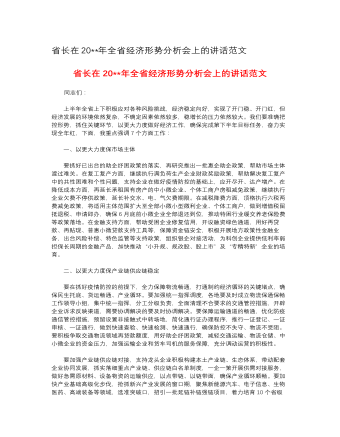
省长在2023年全省经济形势分析会上的讲话范文
要抓好已出台的助企纾困政策的落实,再研究推出一批惠企助企政策,帮助市场主体渡过难关。在复工复产方面,继续执行满负荷生产企业财政奖励政策,帮助解决复工复产中的共性困难和个性问题,支持企业在做好疫情防控的基础上,应开尽开、达产增产。在降低成本方面,再延长承租国有房产的中小微企业、个体工商户房租减免政策,继续执行企业欠费不停供政策,延长补交水、电、气欠费期限。在减税降费方面,顶格执行六税两费减免政策,将适用主体范围扩大至全部小微小型微利企业、个体工商户,做到增值税留抵退税、申请即办,确保6月底前小微企业全部退还到位,推动特困行业缓交养老保险费等政策落地。在金融支持方面,帮助受困企业修复信用,开设融资绿色通道,用好再贷款、再贴现、普惠小微贷款支持工具等,保障资金链安全,积极开展地方政策性金融业务,出台风险补偿、特色监管等支持政策,组织银企对接活动,为科创企业提供低利率弱担保长周期的金融产品,加快推动“小升规、规改股、股上市”及“专精特新”企业的培育。
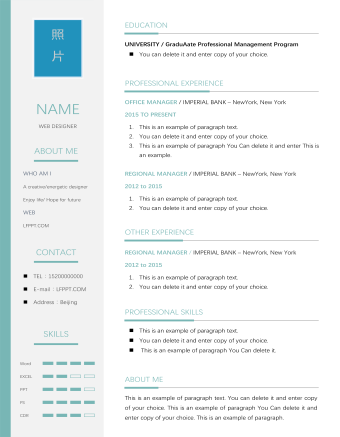
英伦商务应届生英文简历
OFFICEMANAGER / IMPERIAL BANK – NewYork, New York 2015 TOPRESENT1. This is anexample of paragraph text. 2. You candelete it and enter copy of your choice. 3. This is anexample of paragraph You Can delete it and enter This is an example.REGIONALMANAGER / IMPERIAL BANK – NewYork, New York 2012 to20151. This is anexample of paragraph text. 2. You candelete it and enter copy of your choice.
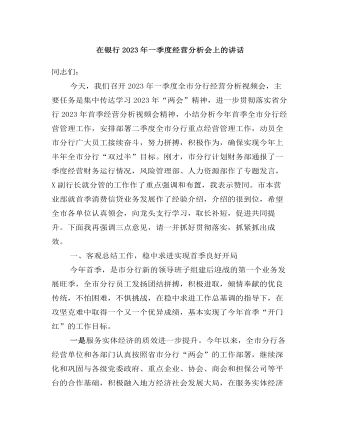
在银行2023年一季度经营分析会上的讲话
同志们:今天,我们召开2023年一季度全市分行经营分析视频会,主要任务是集中传达学习2023年“两会”精神,进一步贯彻落实省分行2023年首季经营分析视频会精神,小结分析今年首季全市分行经营管理工作,安排部署二季度全市分行重点经营管理工作,动员全市分行广大员工接续奋斗,努力拼搏,积极作为,确保实现今年上半年全市分行“双过半”目标。刚才,市分行计划财务部通报了一季度经营财务运行情况,风险管理部、人力资源部作了专题发言,X副行长就分管的工作作了重点强调和布置,我表示赞同。市本营业部就首季消费信贷业务发展作了经验介绍,介绍的很到位,希望全市各单位认真领会,向龙头支行学习,取长补短,促进共同提升。下面我再强调三点意见,请一并抓好贯彻落实,抓紧抓出成效。一、客观总结工作,稳中求进实现首季良好开局今年首季,是市分行新的领导班子组建后迎战的第一个业务发展旺季,全市分行员工发扬团结拼搏,积极进取,倾情奉献的优良传统,不怕困难,不惧挑战,在稳中求进工作总基调的指导下,在攻坚克难中取得一个又一个优异成绩,基本实现了今年首季“开门红”的工作目标。
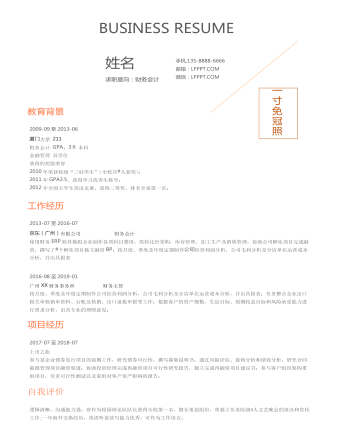
无边框风格中英文简历两套
京东(广州)有限公司 财务会计使用财务ERP软件模拟企业制作各项科目费用,原料比价采购,库存管理,加工生产及销售管理,协助公司孵化项目完成融资,撰写了#个孵化项目独立融资BP;按月度、季度及年度定期制作公司经营利润分析,公司毛利分析及分店单位运营成本分析,并出具报表Jingdong(Guangzhou) Co., Ltd. Financial AccountingUsing financial ERPsoftware to simulate the company's production of various subject costs, rawmaterial price procurement, inventory management, processing production andsales management, assist the company's incubation project to completefinancing, wrote #incubation project independent financing BP; monthly,quarterly and annual production Analysis of the company's operating profit,analysis of the company's gross profit and analysis of the operating costs ofthe branch, and issue a report
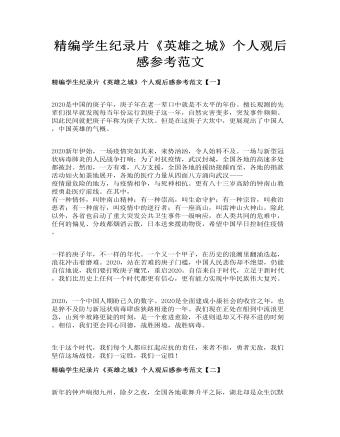
精编学生纪录片《英雄之城》个人观后感参考范文
一样的庚子年,不一样的年代。一个又一个甲子,在历史的浪潮里翻涌迭起,浪花冲击着磨难。2020,站在苦难的庚子门槛,中国人民悲伤却不绝望,仍能自信地说,我们要打败庚子魔咒,重启2020。自信来自于时代,立足于新时代,我们比历史上任何一个时代都更有信心,更有能力实现中华民族伟大复兴。 2020,一个中国人期盼已久的数字。2020是全面建成小康社会的收官之年,也是猝不及防与新冠状病毒肆虐狭路相逢的一年。我们现在正处在船到中流浪更急,山到半坡路更陡的时刻,是一个愈进愈险,不进则退却又不得不进的时刻。相信,我们更会同心同德,战胜困境,战胜病毒。 生于这个时代,我们每个人都应扛起应抗的责任,来者不拒,勇者无敌,我们坚信这场战役,我们一定胜,我们一定胜!

新人教版高中英语必修1Unit 2 Travelling Around-Listening and Speaking & Listening and Talking教案
【教学目标与核心素养】1. Instruct students to get main facts by listening and motivate them to talk about the topics about how to prepare for the trip and make reservations by listening and ultimately can make travel arrangements and reservations. 2. Develop students’ sense of cooperative learning and individual thinking capability. 3. Develop students’ different listening skills to solve different listening comprehensive problems.4. Help students to understand how to use the structures “the present continuous tense (be doing) is used to express future plans.【教学重难点】1. Teach students how to focus on key words, not on single words or grammar.2. Prompt Ss to talk about the related topics, such as how to prepare for the trip and make a travel plan.【教学过程】Step 1: Listening and SpeakingLead inThe teacher is advised to talk with their students about the places that they want to travel most both at home and abroad: boys and girls, if you have a chance to travel around the world, where will you go? After their small talk, the teacher can move on by finishing the following listening task:Before travelling, what do we need to prepare for the trip?

新人教版高中英语必修1Unit 3 Sports and Fitness- Discovering Useful Structures—tag questions教案
【教材分析】This teaching period mainly deals with the grammar: tag questions.This period carries a considerable significance to the cultivation of students’ spoken English. The teacher is expected to enable students to master this period thoroughly and consolidate the knowledge by doing some exercise of good quality.【教学目标与核心素养】1. Get students to have a good understanding of the basic usages of tag questions.2. Enable students to use the basic phrases structures flexibly.3. Develop students’ speaking and cooperating abilities.4. Strengthen students’ great interest in grammar learning.【教学重难点】1. How to enable students to have a good understanding of the basic usages of tag questions.2. How to enable students to use the basic usages of tag questions flexibly.【教学过程】Step1: 语法自主探究一、基本组成方法1.肯定式陈述部分+否定附加疑问部分(前肯后否) You often play badminton, don’t you? 你经常打羽毛球,是吗?You are going to the gym with me, aren’t you?你要和我一起去健身房,是吗?She’s been to shanghai before, hasn’t she? 她以前去过上海,是吗?2.否定式陈述部分+肯定附加疑问部分(前否后肯) It isn't a beautiful flower, is it? 那不是美丽的花,是吗?You didn't go skating yesterday, did you? 你昨天没去滑冰,是吗?They can’t finish it by Friday, can they?他们不能在星期五之前完成,是吗?

新人教版高中英语必修3Unit 1 Festivals and Celebrations-Reading for writing教学设计二
Step 3 Analyzing article structureActivity 31. Teachers raise questions to guide students to analyze the chapter structure of this diary and think about how to describe the festival experience. (1)What should be included in the opening/body/closing paragraph(s)?(2)How did the writer arrange his/her ideas?(3)What kind of interesting details did the writer describe?(4)How did the writer describe his/her feelings/emotions during the event?2. Students read and compare the three sentence patterns in activity 2. Try to rewrite the first paragraph of the diary with these three sentence patterns. After that, students exchange corrections with their partners. Such as:●This was my first time spending three days experiencing the Naadam Festival in China’s Inner Mongolia Autonomous Region and it was an enjoyable and exciting experience. ●I'll never forget my experience at the Naadam Festival because it was my first time to watch the exciting Mongolian games of horse racing, wrestling, and archery so closely. ●I'll always remember my first experience at the Naadam Festival in China’s Inner Mongolia Autonomous Region because it was so amazing to spend three days witnessing a grand Mongolian ceremony. Step 4 Accumulation of statementsActivity 41. Ask the students to read the diary again. Look for sentences that express feelings and emotions, especially those with the -ing form and the past participle. Such as:● …horse racing, wrestling, and archery, which are all so exciting to watch. ● some amazing performances● I was surprised to see…● I was a little worried about. . . ● feeling really tiredOther emotional statements:●I absolutely enjoyed the archery, too, but the horse races were my favourite part. ●I'm finally back home now, feeling really tired, but celebrating Naadam with my friend was totally worth it. ●He invited me back for the winter to stay in a traditional Mongolian tent and cat hot pot. I can’t wait!2. In addition to the use of the -ing form and the past participle, the teacher should guide the students in the appreciation of these statements, ask them to memorize them, and encourage them to use them reasonably in writing practice.

新人教版高中英语必修3Unit 5 The Value of Money-Discovering Useful Structures导学案
4.They were going to find someone to take part in their bet when they saw Henry walking on the street outside.[归纳]1.过去将来时的基本构成和用法过去将来时由“would+动词原形”构成,主要表示从过去某一时间来看将要发生的动作(尤其用于宾语从句中),还可以表示过去的动作习惯或倾向。Jeff knew he would be tired the next day.He promised that he would not open the letter until 2 o'clock.She said that she wouldn't do that again.2.表示过去将来时的其他表达法(1)was/were going to+动词原形:该结构有两个主要用法,一是表示过去的打算,二是表示在过去看来有迹象表明将要发生某事。I thought it was going to rain.(2)was/were to+动词原形:主要表示过去按计划或安排要做的事情。She said she was to get married next month.(3)was/were about to+动词原形:表示在过去看来即将要发生的动作,由于本身已含有“即将”的意味,所以不再与表示具体的将来时间状语连用。I was about to go to bed when the phone rang.(4)was/were+现在分词:表示在过去看来即将发生的动作,通常可用于该结构中的动词是come,go,leave,arrive,begin,start,stop,close,open,die,join,borrow,buy等瞬间动词。Jack said he was leaving tomorrow.

新人教版高中英语必修3Unit 5 The Value of Money-Listening &Speaking&Talking教学设计
4. A:We’d like to have someone to say a word at the beginning to welcome the group.B:↙Who?A:We thought that you or Dr.Johnson might do it.B用降调说Who,其意思是问,对方想让谁在开场时致欢迎词。Step 6 Pronunciation---Practice1. Listen to the short conversation and mark the intonation with ↗, ↙ or ↙, ↗. Then discuss with a partner what they intend to convey by using different intonation.Owner: You know what ?↗ It’s a million-pound bank note↙.Waiter 1: Really ?↗(question)Waiter 2: Really !↙(unbelievable and surprised)Waiter 3: Really ?!↙↗(first question then surprised)2. Listen to the conversations. Underline the parts that are stressed and mark the intonation. Then talk about the implied meanings of the responses with different intonations. Listen again and repeat.1) Henry: It’s a nice suit.Owner: Oh, it’s perfect!↙(The intonation means it is very suitable for Henry.)2) Henry: Well, that’s very kind of you.Owner: Kind, sir ?↗(what you said is not right) No, it’s kind of you. You must come whenever you want and have whatever you like. Just having you sit here is a great honour !!↙(welcome you to come again)3)Henry:Well, to be honest, I have none. Oliver:(happily) What luck!(excited) Brother↗, what luck!↙(It means “Didn’t you hear it?”)Henry: Well, it may seem lucky to you but not to me!↗(angry) If this is your idea of some kind of joke, I don’t think it’s very funny. Now if you’ll excuse me, I ought to be on my way.↙(If so, I would leave.)Roderick: Please don’t go↙...(hope Henry can wait for a moment)Part B Viewing and Talking---Describe people’s changing attitudes in a film clipStep 1 Before-listening---Tell the filmYou are going to watch part of the film The Million Pound Bank Note. Look at these photos and guess what happens in the film.

新人教版高中英语选修2Unit 2 Bridging Cultures-Discovering useful structures教学设计
The grammar of this unit is designed to review noun clauses. Sentences that use nouns in a sentence are called noun clauses. Nominal clauses can act as subject, object, predicate, appositive and other components in compound sentences. According to the above-mentioned different grammatical functions, nominal clauses are divided into subject clause, object clause, predicate clause and appositive clause. In this unit, we will review the three kinds of nominal clauses. Appositive clauses are not required to be mastered in the optional compulsory stage, so they are not involved.1. Guide the students to judge the compound sentences and determine the composition of the clauses in the sentence.2. Instruct students to try to learn grammar by generalizing grammar rules, controlling written practice, and semi-open oral output.3. Inspire the students to systematize the function and usage of noun clause1.Instruct students to try to learn grammar by generalizing grammar rules, controlling written practice, and semi-open oral output.2.Inspire the students to systematize the function and usage of noun clauseStep1: The teacher ask studetns to find out more nominal clauses from the reading passage and udnerline the nominal clauses.

新人教版高中英语必修1Unit 1 Teenage Life-Listening and Speaking & Listening and Talking教案
Step 2 Listening and Talking1. The teacher is advised to talk with their new students about the related topic: Boys and girls, do you know some structures to talk about future activities? Talking about future activitiesWe’ll …I plan to …There’ll be …I hope to …We’re going to …2. After their small talk, the teacher can move on by playing the listening and solve the following task.Underline the expressions in the sentences below Cao Jing and Max use to talk about the future.We’ll learn useful skills.I plan to improve my spoken English.There’ll be students from different schools.I hope to make new friends.We’ll talk about teenage life.I’ll learn to make a fire.There’ll be students from different countries at the camp.There’ll be some experts there to show us how to live in the wild.We’re going to learn about wildlife.I’m going to give a speech.I think I’m going to enjoy the activities.I think we’ll have a lot of fun.3. Work in groups. Plan a youth camp.Teacher make the Ss think of ideas for the camp. And they can use the questions below to get started. And have the Ss present their ideas for a youth camp to the class.●What kind of camp is it?●Who will be there?●What will they do?●What will they learn?

新人教版高中英语必修1Unit 3 Sports and Fitness-Listening and Speaking & Listening and Talking教案
Finally, after finishing the task above, the teacher is expected to instruct students to work in groups to finish the following project:Speaking ProjectWhat event or activity would you like to invite your friend to? Make a conversation with a partner.Ski Race: Zhangjiakou, a beautiful city in northern China, will host the Youth Ski Race in December.Track Meet: a great event for track –and –field lovers on 26 October.Gym Class: come and work out at a gym! You can make it.Part 2: Listening and Talking:The teacher is advised to talk with their new students about the related topic: Boys and girls , what do you think of sportsmanship? Let’s listen and find out:Play the listening and match each opinion with the right speaker. Who do you agree with? Why?Cao Jing _____________ Lily _____________ Max _____________A. An athlete should do his/her best to win.B. The girl should stop and help the other girl. Good sportsmanship is more important than wining!C. An athlete should think about honor and his/her fans if he/she is competing for his/her country.Listen again and circle the expressions that you hear in the conversation.

新人教版高中英语必修3Unit 1 Festivals and celebrations-Discovering Useful Structure教学设计
4.That was an experience that frightened everyone. →That was _____________________. 答案:1. taking 2. being discussed 3. in the reading room 4. a frightening experienceStep 6 The meaning and function of V-ing as the predicative动词-ing形式作表语,它通常位于系动词后面,用以说明主语“是什么”或“怎么样”一种表示主语的特质、特征和状态, 其作用相当于形容词; 另一种具体说明主语的内容, 即主语等同于表语, 两者可互换。The music they are playing sounds so exciting. 他们演奏的音乐听起来令人激动。The result is disappointing. 结果令人失望。Our job is playing all kinds of music. 我们的工作就是演奏各种音乐。Seeing is believing. 眼见为实。Step 7 Practice1. It is ________(amaze) that the boy is able to solve the problem so quickly.2. Buying a car is simply _______(waste) money. 3. Please stop making the noise—it’s getting ________(annoy). 4. complete the passage with the appropriate -ing form.La Tomatina is a festival that takes place in the Spanish town Bunol every August. I think many food festivals are __________ because people are just eating. however, this festival is _________ because people don't actually eat the tomatoes. Instead, they throw them at each other! the number of people ________ part in this tomato fight, can reach up to 20,000, and it is a very __________ fight that lasts for a whole hour. The _______ thing is how clean Bunol is after the tomatoes are washed away after the fight. this is because the juice form tomatoes is really good for making surfaces clean!答案:1. amazing 2. wasting 3. annoying4. boring interesting taking exciting amazing